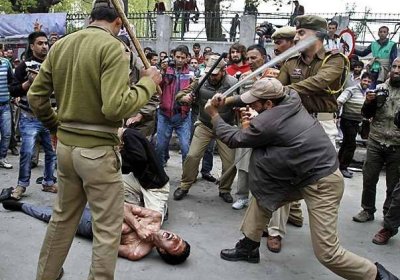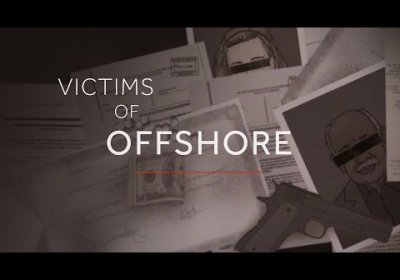The killing of six Kashmiri civilians in Indian-occupied Kashmir have moved Kashmiri communities around the world to organise a coordinated series of vigils on Friday April 22.
"These innocent civilians were murdered by the Indian armed forces during a protest march, after reports of a sexual assault on a minor girl by the Indian troops," said Anjun Rafiqi, one of the organisers of a candlelight vigil planned in Sydney.
International solidarity
Cuba joined a long list of Latin American countries lending assistance to Ecuador on April 18 by deploying a team of 53 health and rescue specialists to treat victims wounded in the devastating 7.8 earthquake that struck the Andean nation April 16, TeleSUR English said. The quake has killed at least 350 people and injuring thousands more.
 Photo: Albaciudad.org.
The Venezuelan Supreme Court unanimously ruled on April 11 that a controversial “amnesty law” passed by the country's right-wing opposition-controlled parliament is unconstitutional, Venezuela Analysis said the next day.
Photo: Albaciudad.org.
The Venezuelan Supreme Court unanimously ruled on April 11 that a controversial “amnesty law” passed by the country's right-wing opposition-controlled parliament is unconstitutional, Venezuela Analysis said the next day.
 Photo: TeleSUR.
International delegations from more than 20 different countries gathered with Honduran social movements on April 14 to demand justice for Berta Caceres, the environmentalist and indigenous activist assassinated in the Central American nation on March 3.
Photo: TeleSUR.
International delegations from more than 20 different countries gathered with Honduran social movements on April 14 to demand justice for Berta Caceres, the environmentalist and indigenous activist assassinated in the Central American nation on March 3.
“The police and military are using every kind of violence against the Kurds. They are using tanks and heavy armoured vehicles. They have flattened houses, historical places, mosques. They use helicopters and technological weapons, night vision binoculars and drones. They don't let families get to the bodies of youths who were killed. Corpses remain on the streets for weeks.”
Baran, a Kurdish political activist who now lives in exile, described the massacres taking place in Kurdish cities in Turkey. Baran is from Amed, or Diyarbakır in Turkish.
The Spanish parliament was the scene of a sharp clash on April 6 over the March 18 European Union-Turkey “pact of shame” that will return up to 50,000 asylum seekers from Greece to Turkey. The asylum seekers — most fleeing from the Syrian civil war — will then be placed in an archipelago of detention centres.
Acting Spanish prime minister Mariano Rajoy, of the conservative People's Party (PP), defended the agreement, saying “things are getting better, we have a procedure”.
 Members of the Oromo community in Melbourne protest against the Ethiopian regime, January 3. Photos: Ali Bakhtiarvandi.
“This government is at least better than previous ones,” remarked a 74-year-old Eritrean man to me last month in the Ethiopian capital of Addis Ababa, his longtime residence.
Members of the Oromo community in Melbourne protest against the Ethiopian regime, January 3. Photos: Ali Bakhtiarvandi.
“This government is at least better than previous ones,” remarked a 74-year-old Eritrean man to me last month in the Ethiopian capital of Addis Ababa, his longtime residence.
The beating heart of the tax avoidance practice and industry is the city of London, Mark Donne, director of the award-winning documentary UK Gold told TeleSUR English in light of the recent Panama Papers scandal.
Donne emphasised that the practice has cost the Global South trillions of dollars in plundered resources and wealth.
“You really have to think of the Cayman Islands, the British Virgin Islands and all those territories as branches, nothing more than just branches,” Donne told TeleSUR English in an interview on April 4.
In a move that has shocked Wall Street and Washington, the Puerto Rican Senate and the House of Representatives have passed an emergency declaration authorising the governor to suspend payments on US$72 billion in public debt, Democracy Now! said on April 6.
One of the most shocking revelations of the Panama Papers is that US protected multinationals and many of their allies around the world have US$32 trillion in tax havens.
It is very hard to find words that can even begin to describe how progressive people all over Europe are viewing the “pact of shame” over refugees reached between the European Union and Turkey on March 18.
For €6 billion, the promise of accelerated EU access and a conditional end to Turkish citizens requiring visas to enter the EU, the agreement makes the repressive Turkish government of Recep Tayyip Erdogan the main cop controlling the flow of refugees towards Europe.
Cuban President Raul Castro has insisted on the need for the United States to end its more than 50-year-long economic blockade on the Caribbean island after US president Barack Obama’s historic visit to the island on March 21.
Castro also took the opportunity of the first visit to Cuba by a US president in more than 80 years to say his government rejected “double standards” on human rights.
- Previous page
- Page 112
- Next page








